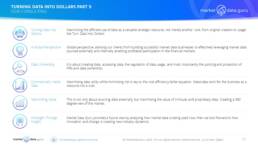CONVERTING MARKET DATA TREASURE TO DOLLARS
In the previous articles from this series we have analysed the foundations of creating a market data business. In this final chapter we focus on developing three core principles aimed at making the business function in practice. These are:
1.Effective Intellectual Property Rights (IPR) management, without the data ownership framework there is no business. There are no sales of data, there are sales of licences to use the data. It is more than a principle, it is the number one rule on the list
2.Understanding the market value of the data. Consumers will only buy/licence if it makes them money, altruism is a luxury, so the way in which data can be packaged, who is going to derive the best value, how and why comes into play. It is all about usage and avoiding the constraints of commercially stifling artificial straightjackets. Flexibility is key
3.Making data assets revenue generators. Data is expensive when viewed and subscribed to in aggregate, so the data source can only maximise dollar revenues by having clear and transparent licences, agreements, and pricing structures, the provide the basis for a level playing field for all data consumers.
WHAT DOES THE MARKET WANT?
The only constant is the continuous change in what the market wants (okay other than free data, which is not going to happen), which places an emphasis on data sources developing strong relationships with the other players in the data supply chain, each of which have their own objectives and agendas. There is no one single ‘market’.
At the high end the data consumer, and regulators, want data quality, defined as accurate, consistent, and timely. Then apply these characteristics to the individual markets they serve, for instance the data available for coverage of a highly liquid market like US Treasuries, and its accompanying attributes is quite different (British understatement) from in demand ESG supply chain data.
If there is a second constant it is the application of FRAND, ‘Fair, Reasonable, and Non-Discriminatory’ pricing, licencing, and policies, or at very least transparency.
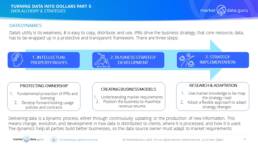
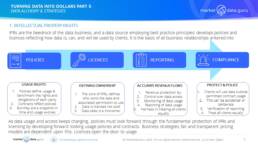
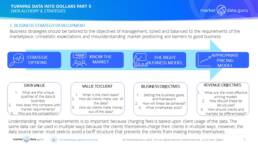
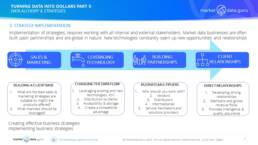
TOOLS FOR THE JOB
The primary tools for the job are the policies, licences, agreements, that comprise the business and pricing models. Research and understanding the marketplace for the data are the key elements. Knowing what the client wants is one thing, understanding how they derive significant benefit, and why, is more important.
This requires constant validation through communication and engagement.
SUMMARY
Creating a successful commercial enterprise that complements and enhances the core business look to four principles:
1.Develop clear and concise business objective by (i) Making data assets revenue generators, (ii) Understanding the market value of data, built around (iii) effective Intellectual Property Rights management
2.Understanding data assets to utilise them by (i) knowing the clients, (ii) leveraging new technologies & channels to market, and (iii) use partners as business multipliers
3.Making data work profitably because (i) Data Licensing is a high margin, profitable business in its own right, (ii) It provides additional revenue streams which directly benefit the bottom line, (iii) It strengthens the relationship between the source provider and the end user, and (iv) knowing what price data is available internally will provide regulatory and cost benefits
4.Relationships generate revenue (i) As the IDBs and vendors have discovered and leverage, usage of source data across a clients’ enterprise correlates to increased trading volumes for the source, (ii) Equally embedding a sources’ data in analytics and models also correlates to increased trading volumes for the source, (iii) Once source data becomes consumed within enterprise wide applications it is extremely difficult to remove, which (iv) increases the ‘stickiness’ of the data, and revenue
The same market data business strategy successfully operating in one environment does not automatically translate to accomplishing the same results in another. Which is why assumptions are no substitution for experience, expertise, and working with the data consumer
Keiren Harris 03 August 2022
Please contact info@marketdata.guru for a pdf copy of the article
For information on our consulting services please email knharris@datacompliancellc.com
